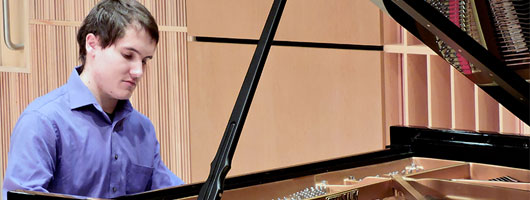 Pictured | Taylor Lyles | Music Education, Instrumental | La Porte, Indiana (hometown)
Pictured | Taylor Lyles | Music Education, Instrumental | La Porte, Indiana (hometown)Music Director, Michigan City High School
About the Bachelor of Music in Piano
The Bachelor of Music (B.M.) is a professional undergraduate degree that offers rigorous musical training with a solid foundation in general education. It prepares students for a performance and composition and/or private teaching career. The Bachelor of Music degree program is designed for a strong music education with academic and practical experience.
Bachelor of Music students complete the core curriculum of music studies: music theory, aural and piano skills, and music history. Students also fulfill campuswide general-education courses. In addition to academic music courses, students also take lessons with applied music faculty and participate in university ensembles and chamber music. Performance opportunities include recitals, opera, opera workshop, and outreach performances in the community.
Academic Advising
The Ernestine M. Raclin School of the Arts policy on advising requires that students meet with their academic advisors each semester prior to registration. Advising holds are placed on all Music students prior to advance registration and are released following advising appointments. Students with a declared major in Music are advised by Music faculty. Additionally, you may have a secondary adviser if you have also declared a minor, although a minor is not required for a degree in the Music department. You can verify your assigned advisor in the student center in One.IU.
Degree Requirements (120 cr.)
Degree Map >>
Students receiving the Bachelor of Music in Piano degree must complete 120 total credit hours including:
- IU South Bend Campuswide General Education Curriculum (39 cr.)
- Major Requirements (59 cr.)
- Music Electives (10 cr.)
- General Electives (6 cr.)
- World Languages (6 cr.)
- A minimum of 30 credit hours at the 300- or 400-level.
- Courses required for the major must be completed with a grade of C– or higher.
- A minimum CGPA of 2.0 is required.
Major Requirements (59 cr.)
Core Musicianship (25 cr.)
Music Theory and History
- MUS-M 201 The Literature of Music 1
- MUS-M 202 The Literature of Music 2
- MUS-M 430 Introduction to Contemporary Music
- MUS-T 113 Music Theory I
- MUS-T 114 Music Theory II
- MUS-T 115 Sightsinging and Aural Perception I (1 cr.)
- MUS-T 116 Sightsinging and Aural Perception II (1 cr.)
- MUS-T 213 Music Theory III
- MUS-T 214 Music Theory IV
- MUS-T 215 Sightsinging and Aural Perception III (1 cr.)
- MUS-T 216 Sightsinging and Aural Perception IV (1 cr.)
Other Music Requirements (0 cr.)
- MUS-I 100 Cultural Events Attendance (0 cr.)(eight semesters)
- MUS-U 310 Performance Laboratory (0 cr.)(each semester prior to passing Upper-Divisional Examination)
- MUS-X 296 Applied Music Upper-Divisional Jury Examination (0 cr.)
Applied Music (12 cr.)
- MUS-I 411 Bachelor of Music Junior Recital (0 cr.)
- MUS-I 412 Bachelor of Music Senior Recital (0 cr.)
- MUS-P 400 Piano Undergraduate Major (1 cr.) (four semesters or until Upper-Divisional Examination is passed)
- MUS-P 400 Piano Undergraduate Major (2 cr.) (four semesters)
Ensemble (8 cr.)
- MUS-X 002 Piano Accompanying (1 cr.) (six semesters)
- MUS-X 070 University Choral Ensembles (1 cr.) (two semesters)
Chamber Music (4 cr.)
- Chamber music or small ensemble (1 cr.) (four semesters)
Other Music (10 cr.)
- MUS-E 493 Piano Pedagogy (2 cr.)
- MUS-G 370 Techniques for Conducting (2 cr.)
- MUS-M 443 Survey of Keyboard Literature I (2 cr.)
- MUS-M 444 Survey of Keyboard Literature II (2 cr.)
- MUS-P 211 Keyboard Technique (2 cr.)
Music Electives (10 cr.)
- At least 6 credits at the 300-level or above
- No more than 6 credits in applied music
General Electives (6 cr)
- Two non-music electives at the 200-level or above
World Languages (6 cr.)
- Two semesters of one language (may be satisfied with world languages placement test and credit by examination)